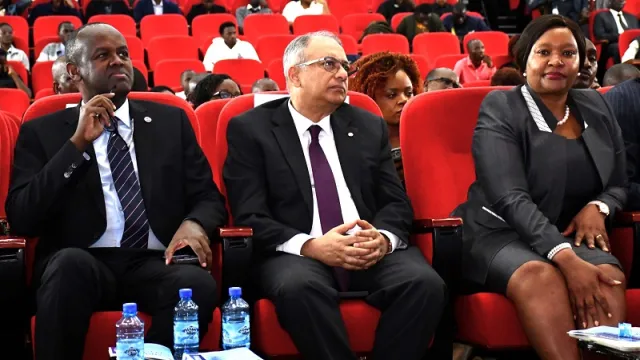Stakeholders advocate for collective innovation efforts

Stakeholders advocate for collective innovation efforts
The Nairobi Innovation Week, a two-week event held at the University of Nairobi, served as a nexus for academia, industry stakeholders, innovators, start-ups, and the student community.
With this year's theme, "Strengthening Innovation Ecosystem in Higher Education Institutions through Academia-Industry-Government-Community Linkages for Sustainable Development," the event illuminated the critical role of collaboration in accelerating innovation in Kenya.
Cabinet Secretary for Trade & Industry Rebecca Miano noted that partnerships between training institutions and industries is critical in propelling economic growth. She outlined ambitious goals, aiming to double foreign and domestic investments, boost exports, and foster industrial expansion, adding that innovation is the linchpin for achieving these goals.
Addressing the delegates, Absa Kenya Managing Director Abdi Mohamed highlighted Kenya's position on the global innovation map, particularly through pioneering solutions in agriculture, health, and fintech sectors, earing the moniker "Silicon Savannah."
Kenya's rising youth population, which is set to soar significantly by 2023, offers a huge pool of talent and entrepreneurial spirit poised for innovation-driven growth.
The country's dominance in fintech investments underscores its appeal as Africa's premier destination for start-up funding, reflecting a vibrant ecosystem that is conducive to innovation.
The event also shed light on Kenya's evolving technology landscape, with staggering statistics showing exponential growth in mobile and internet penetration. Currently, the country has 66 million mobile subscribers and about 18 million internet users, a fertile ground for innovation to thrive.
Read also: Seeds of change: powering agribusiness for Kenya’s prosperity
Role of private sector in driving innovation
“As a private sector, we have a big role to play in driving the innovation ecosystem and we are keen to be part of such conversations. Our approach as Absa is to look at innovation as an ecosystem in a way that can be commercialized to scale up ideas of our innovators and start-ups to be the next Absa or M-PESA through strategic partnerships that are crucial in taking this conversation to the next level,” said Mohamed.
“In the area of innovation, we prioritize entrepreneurial skills and entrepreneurship and prepare the youth of this country for the market; job market and entrepreneurship. In 2017, we launched the Ready To Work programme, an online free training programme for young people, that targets to train 1 million youth and so far we have impacted over 300,000 young people with digital and soft skills to help them transition smoothly from institutions of higher learning to the job market,” he added.
Kenya’s workforce has been ranked among the best globally in terms of innovation, creativity and productivity. The World Intellectual Property Organisation ranked Kenya’s innovation ecosystem at number eight out of 28 economies in Sub-Saharan Africa in its 16th edition of the 2023 Global Innovation Index Report.
“Our role is to transform our society and address the lack of employment and create wealth by building a strong innovation ecosystem. The Nairobi Innovation Week is a platform by the University of Nairobi to bring together different players and stakeholders, a linkage between the industry and the academia to provide solutions, that is through innovation and entrepreneurship, to problems that confront us as a nation and contribute to the 2063 African Agenda and the attainment of SDGs,” said University of Nairobi Vice-Chancellor Prof. Stephen Kiama.
The Nairobi Innovation Week is a three-day event, hosted by the University of Nairobi, that brings together key stakeholders, innovators, students, government representatives and the private sector.



